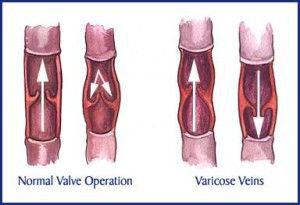Chronic Venous Insufficiency
Chronic Venous Insufficiency (CVI) is where the veins cannot pump enough oxygen-poor blood back to the heart. More precisely, CVI means the venous valves in the legs responsible for blood return back to the heart from the legs is defective – venous valves prevent reverse blood flow. Chronic swelling of the legs and ankles can  occur from the blood pooling and vein damage. Sometimes there will be leg ulcers that do not heal normally. Persons with this medical condition have difficulty in standing long or sitting with their feet on the floor. Most folks with this condition need to elevate their legs much of the time. It is this need to elevate the legs that cause the inability to work at a regular job on a full time basis.
occur from the blood pooling and vein damage. Sometimes there will be leg ulcers that do not heal normally. Persons with this medical condition have difficulty in standing long or sitting with their feet on the floor. Most folks with this condition need to elevate their legs much of the time. It is this need to elevate the legs that cause the inability to work at a regular job on a full time basis.
- Medical Findings The Social Security Administration Looks for in CVI cases: Incompetency of deep venous system
- Obstruction of deep venous system
- History of deep venous thrombosis
- Superficial thrombophlebitis history
- Varicosities
- Chronic edema in leg or legs
- Fullness, aching or tiredness in leg or legs
- Skin pigmentation changes
- Plethysmograpy testing demonstrating chronic venous insufficiency
- Positive Trendelenberg’s test
- Extensive brawny edema, involving at least two-thirds of the leg between the ankle and knee or the distal one-third of the leg between the ankle and hip
- Superficial varicosities
- Stasis dermatitis
- An ulceration that will not go away which has not healed following at least 3 months of prescribed medical or surgical therapy
Peripheral Arterial Disease Symptoms
- Painful cramping in the hip, thigh or calf muscles after walking or climbing stairs or other similar activity
- Leg numbness or weakness
- Coldness in your lower leg or foot
- Sores on your toes, feet or legs that won’t heal
- A change in the color of your legs
- Feet and leg hair loss or slower hair growth on this areas
- Slower growth of your toenails
- Shiny skin on your legs
- Weak pulse or no pulse in your legs or feet
- Erectile dysfunction in men
Test Results SSA Looks For
- Resting ankle/brachial systolic blood pressure ratio of less than 0.50
- Decrease in systolic blood pressure at the ankle on exercise of 50% or more of pre-exercise level at the ankle, and you need at least 10 minutes before returning to pre-exercise level
- Systolic pressure of less than 30 mm Hg in the resting toe
- Resting toe/brachial systolic blood pressure ration of less than 0.40
What Our Clients Say:
Member:

Attorney Gregory Kornegay
Greg is a trial attorney in Wilmington with over 30 years of experience. Greg was born and raised in southeastern North Carolina. Before law school he managed a store with employees making a payroll every week. His first job out of law school was as an Assistant District Attorney investigating and trying cases for the State of North Carolina. Through the years he has handled many different types of cases – including death penalty cases.
Being married with children has been a blessing and a challenge, but has served him well in understanding the problems individuals and families face as they live out their lives. Greg believes that each case is different and the needs of each client are unique, but there are certain themes of life that we all share.


